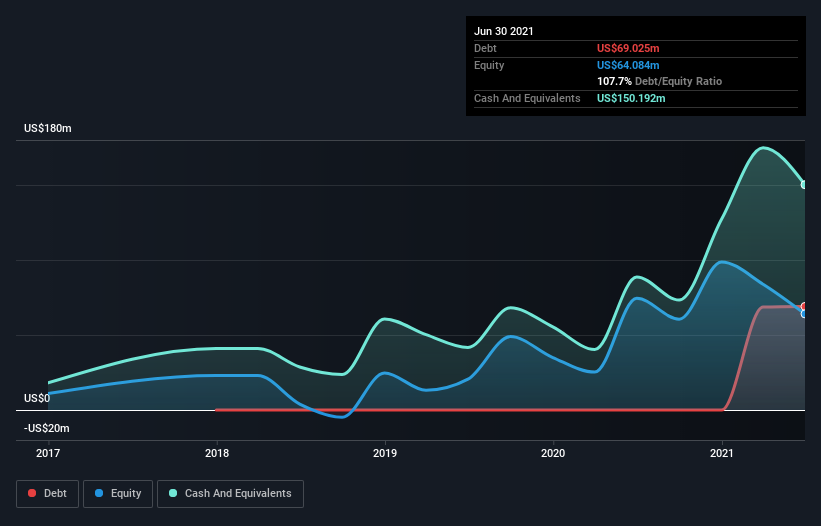- United States
- /
- Biotech
- /
- OTCPK:GMDA.Q
Gamida Cell (NASDAQ:GMDA) Has Debt But No Earnings; Should You Worry?

Legendary fund manager Li Lu (who Charlie Munger backed) once said, 'The biggest investment risk is not the volatility of prices, but whether you will suffer a permanent loss of capital.' When we think about how risky a company is, we always like to look at its use of debt, since debt overload can lead to ruin. We can see that Gamida Cell Ltd. (NASDAQ:GMDA) does use debt in its business. But the more important question is: how much risk is that debt creating?
What Risk Does Debt Bring?
Generally speaking, debt only becomes a real problem when a company can't easily pay it off, either by raising capital or with its own cash flow. In the worst case scenario, a company can go bankrupt if it cannot pay its creditors. However, a more usual (but still expensive) situation is where a company must dilute shareholders at a cheap share price simply to get debt under control. Having said that, the most common situation is where a company manages its debt reasonably well - and to its own advantage. The first step when considering a company's debt levels is to consider its cash and debt together.
See our latest analysis for Gamida Cell
What Is Gamida Cell's Debt?
The image below, which you can click on for greater detail, shows that at June 2021 Gamida Cell had debt of US$69.0m, up from none in one year. However, it does have US$150.2m in cash offsetting this, leading to net cash of US$81.2m.

A Look At Gamida Cell's Liabilities
Zooming in on the latest balance sheet data, we can see that Gamida Cell had liabilities of US$22.6m due within 12 months and liabilities of US$100.0m due beyond that. Offsetting this, it had US$150.2m in cash and US$103.0k in receivables that were due within 12 months. So it can boast US$27.7m more liquid assets than total liabilities.
This short term liquidity is a sign that Gamida Cell could probably pay off its debt with ease, as its balance sheet is far from stretched. Succinctly put, Gamida Cell boasts net cash, so it's fair to say it does not have a heavy debt load! When analysing debt levels, the balance sheet is the obvious place to start. But ultimately the future profitability of the business will decide if Gamida Cell can strengthen its balance sheet over time. So if you're focused on the future you can check out this free report showing analyst profit forecasts.
Given its lack of meaningful operating revenue, Gamida Cell shareholders no doubt hope it can fund itself until it has a profitable product.
So How Risky Is Gamida Cell?
By their very nature companies that are losing money are more risky than those with a long history of profitability. And we do note that Gamida Cell had an earnings before interest and tax (EBIT) loss, over the last year. Indeed, in that time it burnt through US$76m of cash and made a loss of US$86m. With only US$81.2m on the balance sheet, it would appear that its going to need to raise capital again soon. Overall, its balance sheet doesn't seem overly risky, at the moment, but we're always cautious until we see the positive free cash flow. When analysing debt levels, the balance sheet is the obvious place to start. However, not all investment risk resides within the balance sheet - far from it. Case in point: We've spotted 4 warning signs for Gamida Cell you should be aware of, and 1 of them is a bit concerning.
Of course, if you're the type of investor who prefers buying stocks without the burden of debt, then don't hesitate to discover our exclusive list of net cash growth stocks, today.
New: Manage All Your Stock Portfolios in One Place
We've created the ultimate portfolio companion for stock investors, and it's free.
• Connect an unlimited number of Portfolios and see your total in one currency
• Be alerted to new Warning Signs or Risks via email or mobile
• Track the Fair Value of your stocks
This article by Simply Wall St is general in nature. We provide commentary based on historical data and analyst forecasts only using an unbiased methodology and our articles are not intended to be financial advice. It does not constitute a recommendation to buy or sell any stock, and does not take account of your objectives, or your financial situation. We aim to bring you long-term focused analysis driven by fundamental data. Note that our analysis may not factor in the latest price-sensitive company announcements or qualitative material. Simply Wall St has no position in any stocks mentioned.
Have feedback on this article? Concerned about the content? Get in touch with us directly. Alternatively, email editorial-team (at) simplywallst.com.
About OTCPK:GMDA.Q
Slightly overvalued with weak fundamentals.
Market Insights
Community Narratives



